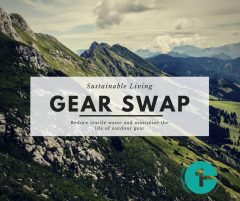by Carly Foubert, CFICE Communications RA
Outdoor gear is expensive! And it’s always a bummer when you get it out of storage only to find that it no longer fits. From ski boots to snow pants to rain jackets, it happens to everyone but that doesn’t make it any less disappointing when it happens to you.
Or remember that snowboard that you bought brand new 3 seasons ago when you vowed to learn how to snowboard? You had good intentions, but after a couple tries you decided that snowboarding just wasn’t for you and packed the gear away where it’s been ever since. 
I think it’s safe to say that we’ve all done this before. Maybe it’s time to clear out and rethink some of our purchases? But just because you don’t have a use for the gear, doesn’t mean someone else won’t use it. As the saying goes, one person’s trash is another person’s treasure.
Since outdoor gear is expensive, but durable as it’s able to withstand the elements, the best thing to do with old gear is to pass it on to someone who will use it. Gear swaps and trading are great ways to do this, not only does someone else save money by buying the gear for a fraction of what it would cost brand new, but you also recover some of the price that you paid for the products.
 Mountain Equipment Co-op (MEC) offers a free online platform for swapping gear. If you’re selling gear on the platform be sure to include pictures and descriptions so that potential buyers know the condition and usage it has experienced.
Mountain Equipment Co-op (MEC) offers a free online platform for swapping gear. If you’re selling gear on the platform be sure to include pictures and descriptions so that potential buyers know the condition and usage it has experienced.
If you’re purchasing gear second hand gear be cautious, read descriptions and ask questions to ensure that gear is still in usable condition.
If you find that your gear is unusable and unsellable because it’s damaged, don’t throw it out! There are plenty of resources online to show you how to repair rips and tears in your gear. Here is a link to some videos to that offer techniques on how to fix. If it’s beyond repair you can upcycle it yourself or some outdoor brands will upcycle their products themselves. Patagonia encourages customers to mail in their damaged products to be recycled.
Upcycling and gear swaps are a great sustainable trick to save money and also combat consumerism and textile waste. Keep it mind if you’re in need of new gear this winter season or have excess gear that you no longer need and use.